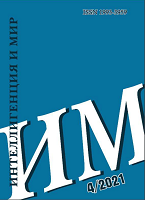Секуляризация идеи церкви в трудах научной интеллигенции Украинской ССР второй половины 1980-х гг.
Secularization of the idea of the Church in the works of the scientific intelligentsia of the Ukrainian SSR in the second half of the 1980s.
Author(s): R. A. SavchukSubject(s): Christian Theology and Religion, History of Church(es), Politics and religion, Nationalism Studies, Post-War period (1950 - 1989), Eastern Orthodoxy
Published by: Ивановский государственный университет
Keywords: secularization; Ukrainian intelligentsia; Orthodox Church; Ukrainian church question; religious consciousness; ideology; nationalism;
Summary/Abstract: In modern conditions, there is an increased public attention to the religious factor in the interstate relations between Russia and Ukraine. The growing tension in the development and internal structure of the Orthodox Church has been observed in Ukraine since the declaration of independence, when parallel Orthodox Church organizations with different attitudes to the issue of autocephaly and cultural and political orientation began to form on the territory of the state. This article attempts to analyze the main directions in understanding the role and place of the church factor. It was in the second half of the 1980 s that the foundations were laid for the development of discussions on the development of the national church after Ukraine's declaration of independence. With the help of historical-typological and historical-comparative methods, the publications of Ukrainian historians, literary critics, philosophers and public figures of the second half of the 1980 s are analyzed. Conclusions about the formation of two directions of the secularization of the idea of the Church in the worldview of the Ukrainian secular intelligentsia of this period are substantiated. The rational-sensuous direction is typical for representatives of nationalist-minded circles. The authors in this direction valued the authority of the Church as an autonomous public institution, but sought to subordinate it to the national idea, to put it at the service of the state ideology. The second direction — conventionally called utilitarian instrumentalist-developed on the basis of Soviet atheist ideology and considered the Church and religion as a whole as an element of ideology, an instrument for the implementation of political power and public consciousness.
Journal: Интеллигенция и мир
- Issue Year: 2021
- Issue No: 4
- Page Range: 49-71
- Page Count: 23
- Language: Russian

